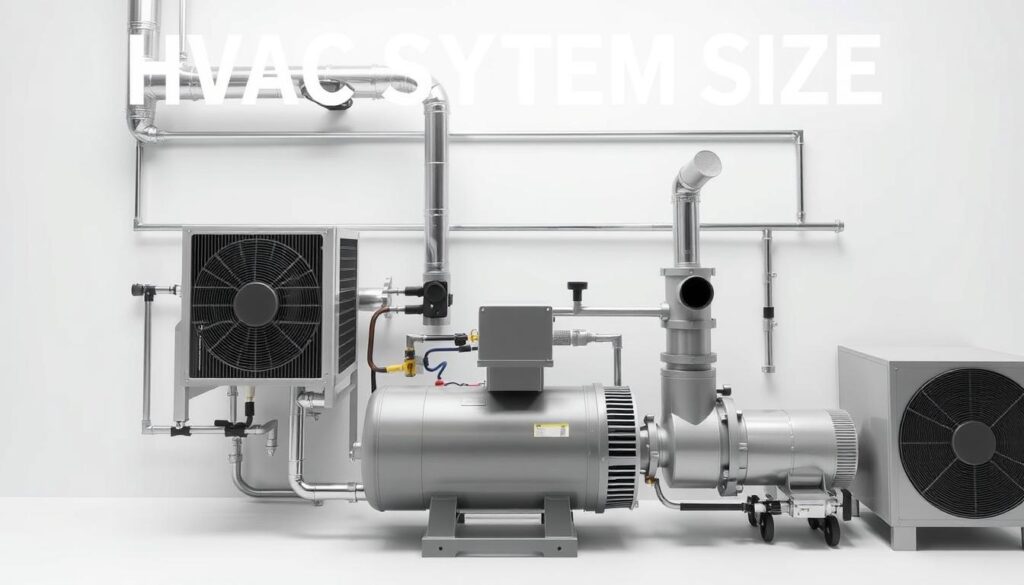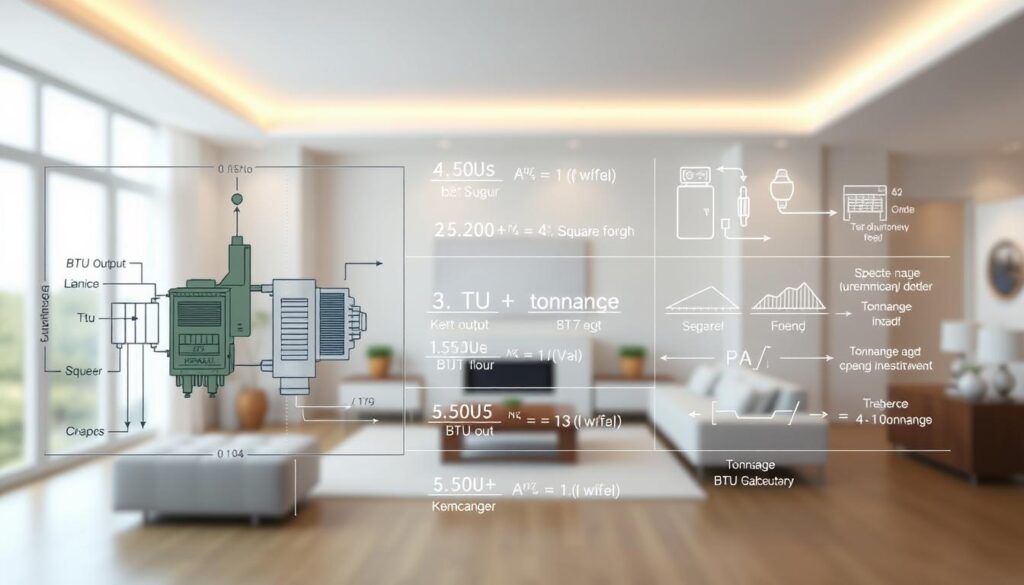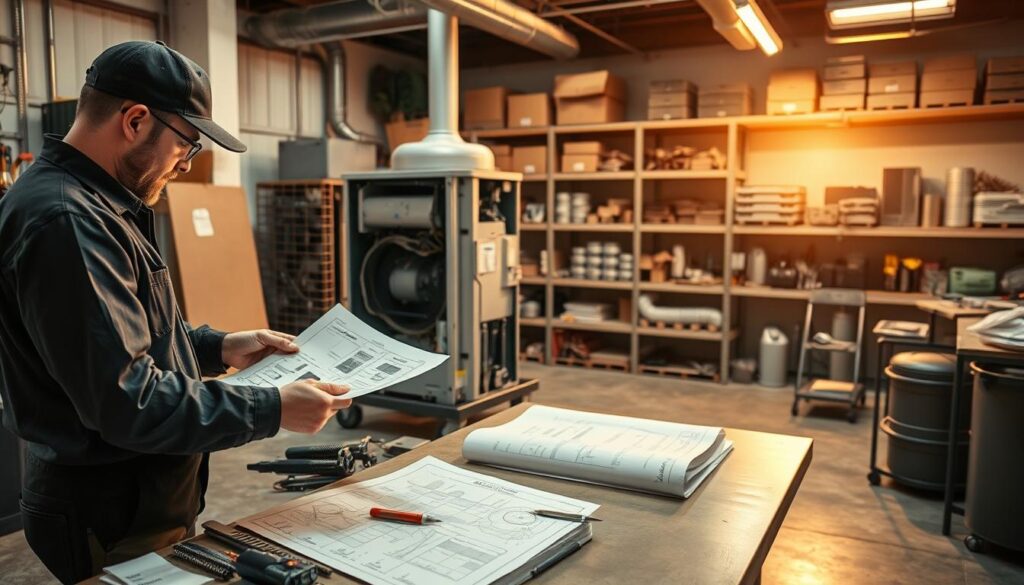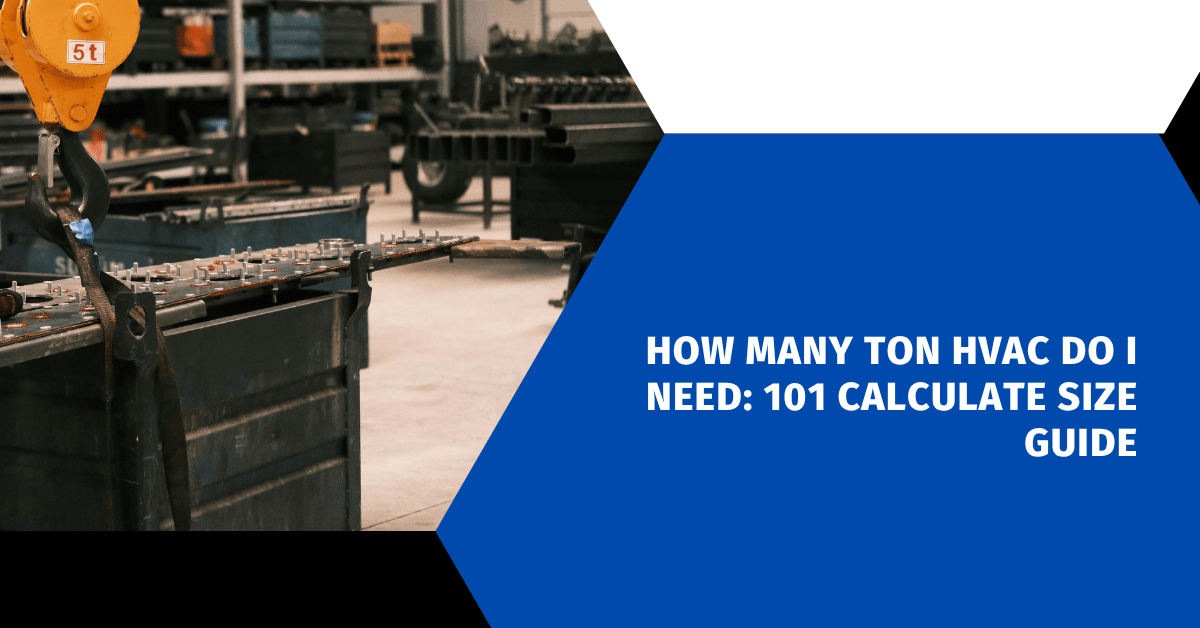Affiliate Disclosure
HVAC Guide Guys is a participant in the Amazon Services LLC Associates Program, an affiliate advertising program designed to provide a means for sites to earn advertising fees by advertising and linking to Amazon.
How Many Ton HVAC Do I Need? Ever thought if your home’s heating and cooling system is as efficient as it could be? Finding the right HVAC system size is key. It’s not just about comfort; it’s about saving energy and money in the long run.

Choosing the right HVAC system size is vital for a comfortable home. Many homeowners find it hard to figure out how many ton HVAC they need. This guide will help you find the perfect HVAC system for your home.
Calculating the right HVAC system size is more than just measuring your home’s square footage. It involves a detailed approach that looks at several factors. This ensures your system works well and saves energy.
Key Takeaways
- Proper HVAC sizing prevents energy waste and unnecessary expenses
- Multiple factors influence the ideal HVAC system capacity
- Professional assessment can help determine precise system requirements
- Incorrect sizing leads to comfort and efficiency problems
- Climate and home characteristics play a critical role in HVAC selection
Table of Contents
Understanding HVAC System Sizing Basics
Choosing the right HVAC system for your home is more complex than many homeowners realize. A proper hvac installation requires careful consideration of multiple factors to ensure optimal performance and energy efficiency.
The success of your home’s heating and cooling depends on accurate hvac load calculation. Getting the right size matters significantly for your comfort and utility expenses.
Why Proper Sizing Matters
An appropriately sized HVAC system provides several critical benefits:
- Consistent indoor temperature control
- Optimal energy efficiency
- Reduced wear and tear on equipment
- Lower monthly utility bills
The Impact of Incorrect HVAC Sizing
Selecting the wrong system size can create significant problems for your home’s comfort and your wallet:
- Undersized units struggle to cool or heat your space effectively
- Oversized units cycle on and off frequently, wasting energy
- Increased maintenance costs
- Reduced system lifespan
Common Sizing Mistakes to Avoid
Homeowners often make critical errors when selecting HVAC systems. Avoid these common pitfalls by working with professional HVAC contractors who understand precise load calculations and system requirements.
“The right HVAC system is about precision, not just size.”
Professional assessment ensures you select a system that matches your home’s unique characteristics, delivering optimal comfort and efficiency.
Explore Our HVAC Shop
Looking for top-rated HVAC tools, parts, and accessories? Visit our shop and find the perfect solution for your needs.
Visit the ShopSquare Footage and HVAC Capacity Correlation
Choosing the right HVAC system for your home is all about understanding square footage and cooling capacity. Your home’s size is key to finding the right hvac ton capacity. This ensures your home stays cool and comfy.
An hvac square footage calculator shows that different homes need different cooling capacities. HVAC pros use a rule of thumb: 20 BTUs per square foot to guess the system size needed.
- 1,000 sq ft home: Approximately 2-3 ton system
- 1,500 sq ft home: Approximately 3-4 ton system
- 2,000 sq ft home: Approximately 4-5 ton system
“Accurate HVAC sizing is more art than science, balancing precise calculations with practical home characteristics.” – HVAC Industry Expert
Knowing about hvac ton capacity is more than just measuring square footage. Things like ceiling height, insulation, window placement, and local weather also matter a lot.
| Home Size | Recommended HVAC Capacity | BTU Range |
|---|---|---|
| 800-1,000 sq ft | 2 tons | 24,000-30,000 BTUs |
| 1,000-1,500 sq ft | 3 tons | 36,000-42,000 BTUs |
| 1,500-2,000 sq ft | 4 tons | 48,000-54,000 BTUs |
Pro Tip: While square footage is a good start, always get a pro HVAC tech to check your cooling needs fully.
How Many Ton HVAC Do I Need for My Home
Finding the right HVAC system for your home is a detailed process. It’s about more than just the size of your home. It’s about making sure your home is comfortable and uses energy wisely. Experts look at many factors to get it just right.
Experts use the Manual J method to figure out what your home needs. This method looks at several things that affect how your home heats and cools:
- Total square footage of your living space
- Insulation quality
- Number and type of windows
- Local climate zone
- Home orientation and sun exposure
Understanding BTU Requirements
The amount of BTUs your home needs can vary a lot. Generally, you need about 20 BTUs for each square foot of living space. But, the climate where you live is very important for figuring out your exact needs.
Climate Zone Considerations
Different areas in the U.S. need different sizes of HVAC systems. For example, homes in very hot areas need more cooling than homes in cooler areas. An HVAC expert can help you find the best system for your area.
Getting the right HVAC size is not just about feeling comfortable. It’s also about saving energy and money in the long run.
Explore Our HVAC Shop
Looking for top-rated HVAC tools, parts, and accessories? Visit our shop and find the perfect solution for your needs.
Visit the ShopTypes of HVAC Systems and Their Sizing Requirements
Choosing the right HVAC system is key for comfort and saving energy in your home or business. Each type has its own size needs. These needs affect how well the system works and how much energy it uses.
Knowing about commercial HVAC sizing helps pick the best system for your needs. Let’s look at the main HVAC types:
- Split-System Air Conditioners
- Heat Pumps
- Packaged Units
- Ductless Mini-Split Systems
Each system has its own energy-saving benefits. The size you need depends on several important factors:
| HVAC System Type | Typical Sizing Range | Best Suited For |
|---|---|---|
| Split-System | 1.5 – 5 tons | Residential homes |
| Heat Pump | 2 – 5 tons | Moderate climate zones |
| Packaged Unit | 3 – 20 tons | Commercial spaces |
| Ductless Mini-Split | 0.75 – 4 tons | Small spaces, additions |
When looking at commercial HVAC sizing, think about your space’s size, insulation, and local weather. Energy-saving HVAC systems cut down on costs and keep temperatures just right.
Pro Tip: Always consult with a professional HVAC technician to determine the most suitable system for your specific requirements.
Getting the size right means your HVAC system works best. This avoids wasting energy and keeps the system safe from damage.
Essential Factors Affecting HVAC Size Selection
Choosing the right HVAC system is more than just measuring your home’s size. Your home’s unique features are key to finding the best HVAC system. This ensures comfort and efficiency.
Several important factors affect your HVAC load calculation and system choice. Knowing these can help you decide what’s best for your home’s heating and cooling.
Home Insulation Quality
Your home’s insulation greatly affects its heat retention. Bad insulation means your HVAC system has to work harder and less efficiently. Look at these insulation factors:
- Wall insulation thickness
- Attic insulation quality
- Seal integrity around windows and doors
- Potential air leakage points
Window Configuration and Count
Windows are big heat transfer points in any home. Their size, type, and number greatly impact your HVAC system’s needed power.
| Window Type | Thermal Efficiency Impact | Recommended Action |
|---|---|---|
| Single-pane | High heat transfer | Consider replacement |
| Double-pane | Moderate efficiency | Good baseline performance |
| Low-E triple-pane | Excellent efficiency | Optimal thermal protection |
Local Climate Conditions
Your location is key in choosing an HVAC system. Areas with very hot or cold temperatures need stronger systems than milder climates.
Pro tip: HVAC experts use detailed climate data to figure out your home’s exact heating and cooling needs.
Explore Our HVAC Shop
Looking for top-rated HVAC tools, parts, and accessories? Visit our shop and find the perfect solution for your needs.
Visit the ShopUnderstanding BTU and Tonnage Calculations

Choosing the right HVAC system is key to keeping your home comfy. BTU stands for British Thermal Unit. It shows how much energy is needed to change one pound of water by one degree Fahrenheit.
The size of an HVAC system is measured in tons. One ton can cool 12,000 BTUs per hour. This helps you pick the right size for your home.
- 1 ton = 12,000 BTUs/hour
- Smaller spaces require fewer BTUs
- Larger homes need higher ton capacity
To figure out your home’s HVAC needs, consider a few things. The size of your rooms, how high your ceilings are, how well-insulated your home is, and your local weather all matter.
Choosing the right BTU and ton capacity is important for energy efficiency and comfort.
Experts in HVAC use special math to find the best system for you. They look at your home’s details to suggest the best ton capacity. This ensures your system works well and saves energy.
HVAC Energy Efficiency Ratings and Size Impact
Choosing an energy-efficient HVAC system is key. It affects your comfort and utility bills. The right size can cut energy use and keep your home at the perfect temperature.
Energy efficiency ratings guide homeowners in picking the best heating and cooling systems. They show how well a system works and how much you can save.
Decoding SEER Ratings
SEER (Seasonal Energy Efficiency Ratio) shows how well an air conditioner cools compared to energy use. Higher SEER means a more efficient system:
- 13-15 SEER: Standard efficiency
- 16-20 SEER: High efficiency
- 21+ SEER: Premium efficiency
“Investing in a high-efficiency HVAC system can reduce energy bills by up to 40%.” – Energy Star
Key Energy Consumption Factors
Several things affect your HVAC system’s energy use:
- Proper hvac system sizing
- Home insulation quality
- Regular maintenance
- Thermostat settings
Choosing an energy-efficient HVAC system needs careful thought. Consider your home’s needs and local climate.
Professional HVAC Sizing Assessment Methods
Getting your HVAC system right is more than just measuring your home. It’s about using advanced methods to find the perfect size for your space. Certified technicians use these methods to ensure your system works just right.

Experts do a deep dive during a professional assessment. They look at many important factors:
- Precise home measurements
- Insulation quality analysis
- Window and door configuration
- Local climate conditions
- Home occupancy patterns
The top choice for sizing is the Manual J calculation. It’s a detailed method that includes:
- Calculating total heat gain and loss
- Evaluating room-by-room temperature requirements
- Analyzing structural characteristics
| Assessment Method | Key Features | Accuracy Level |
|---|---|---|
| Manual J Calculation | Comprehensive home analysis | 95-98% |
| Computer Modeling | Advanced software simulation | 90-95% |
| On-Site Evaluation | Direct physical inspection | 85-90% |
Choosing a professional HVAC load calculation means better system performance and energy use. Trained technicians use the latest tools and software. They give you sizing advice that fits your home perfectly.
Explore Our HVAC Shop
Looking for top-rated HVAC tools, parts, and accessories? Visit our shop and find the perfect solution for your needs.
Visit the ShopSigns Your Current HVAC System is Incorrectly Sized
Figuring out if your HVAC system is the right size can save you a lot of money. It also makes your home more comfortable. The right size is key for using less energy and keeping your system running well.
Spotting signs of a wrong-sized system early can prevent bigger problems. A good HVAC system keeps your home at a steady temperature without effort.
- Frequent system cycling on and off
- Uneven temperatures in different rooms
- Consistently high energy bills
- Unusual humidity levels inside your home
- Persistent indoor comfort issues
An oversized HVAC system causes many issues. It cools too fast, leading to short cycles. This wears out parts, uses more energy, and shortens the system’s life.
| System Size Issue | Potential Symptoms | Recommended Action |
|---|---|---|
| Oversized System | Rapid cooling, high humidity | Professional assessment and possible replacement |
| Undersized System | Constant running, can’t reach desired temperature | Check your home’s heating/cooling needs |
“A properly sized HVAC system is the cornerstone of home comfort and energy efficiency.” – HVAC Engineering Professionals
If you think your system might be the wrong size, get a pro to check it. They’ll do detailed tests and suggest the best fix for your home.
Conclusion
Finding out how many ton HVAC you need for your home is a detailed process. It involves looking at many important factors. These factors affect how well your system works and how efficient it is.
Your home’s special features are key in choosing the right heating and cooling. This ensures your home stays comfortable.
Getting a professional to assess your HVAC needs is the best way. They can look at things like insulation, windows, and the local weather. This helps pick the perfect system for your home.
Choosing the right HVAC system saves energy and money in the long run. It also makes your system last longer. By focusing on accurate sizing, you’ll enjoy a cozy home that meets your needs.
Being proactive about HVAC sizing shows you care about your home’s comfort and energy use. Every home is different. So, finding a sizing plan that fits your home is essential for the best performance.

